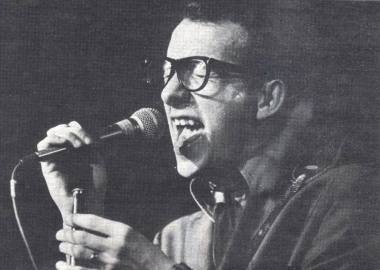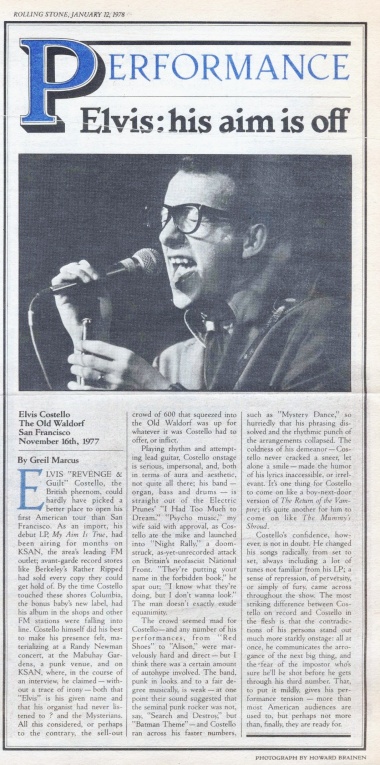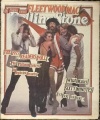Rolling Stone, January 12, 1978: Difference between revisions
(+text +amazon link) |
(update Howard Brainen link) |
||
| (11 intermediate revisions by the same user not shown) | |||
| Line 1: | Line 1: | ||
{{Bibliography header}} | {{Bibliography header}} | ||
{{Bibliography index}} | {{:Bibliography index}} | ||
{{Rolling Stone index}} | {{:Rolling Stone index}} | ||
{{ | {{:US rock magazines index}} | ||
{{Bibliography article header}} | {{Bibliography article header}} | ||
<center><h3> Elvis: his aim is off </h3></center> | <center><h3> Elvis: his aim is off </h3></center> | ||
---- | ---- | ||
<center>Greil Marcus</center> | <center>Greil Marcus</center> | ||
---- | ---- | ||
''' Elvis Costello <br> | |||
Old Waldorf, San Francisco | |||
{{Bibliography text}} | {{Bibliography text}} | ||
Elvis "Revenge & Guilt" Costello, the British pheenom, could hardly have picked a better place to open his first American tour than San Francisco. As an import, his debut LP, ''My Aim Is True'', had been airing for months on KSAN, the area's leading FM outlet; avant-garde record stores like Berkeley's Rather Ripped had sold every copy they could get hold of. By the time Costello touched these shores Columbia, the bonus baby's new label, had his album in the shops and other FM stations were falling into line. Costello himself did his best to make his presence felt, materializing at a Randy Newman concert, at the Mabuhay Gardens, a punk venue, and on KSAN, where, in the course of an interview, he claimed — without a trace of irony — both that "Elvis" is his given name and that his organist had never listened to Question Mark & the Mysterians. All this considered, or perhaps to the contrary, the sell-out crowd of 600 that squeezed into the Old Waldorf was up for whatever it was Costello had to offer, or inflict. | |||
Playing rhythm and attempting lead guitar, Costello onstage is serious, impersonal, and, both in terms of aura and aesthetic, not quite all there; his band — organ, bass and drums — is straight out of the Electric Prunes' "I Had Too Much to Dream." "Psycho music," my wife said with approval, as Costello ate the mic and launched into "Night Rally," a doom-struck, as-yet-unrecorded attack on Britain's neofascist National Front. ''"They're putting your name in the forbidden book,"'' he spat out; ''"I know what they're doing, but I don't wanna look."'' The man doesn't exactly exude equanimity. | |||
The crowd seemed mad for Costello — and any number of his performances, from "Red Shoes" to "Alison," were marvelously hard and direct — but I think there was a certain amount of autohype involved. The band, punk in looks and to a fair degree musically, is weak — at one point their sound suggested that the seminal punk rocker was not, say, "Search and Destroy," but "Batman Theme" — and Costello ran across his faster numbers, such as "Mystery Dance," so hurriedly that his phrasing dissolved and the rhythmic punch of the arrangements collapsed. The coldness of his demeanor — Costello never cracked a sneer, let alone a smile — made the humor of his lyrics inaccessible, or irrelevant. It's one thing for Costello to come on like a boy-next-door version of ''The Return of the Vampire''; it's quite another for him to come on like ''The Mummy's Shroud''. | |||
Costello's confidence, however, is not in doubt. He changed his songs radically from set to set, always including a lot of tunes not familiar from his LP; a sense of repression, of perversity, or simply of fury, came across throughout the show. The most striking difference between Costello on record and Costello in the flesh is that the contradictions of his persona stand out much more starkly onstage: all at once, he communicates the arrogance of the next big thing, and the fear of the impostor who's sure he'll be shot before he gets through his third number. That, to put it mildly, gives his performance tension — more than most American audiences are used to, but perhaps not more than, finally, they are ready for. | |||
{{cx}} | |||
{{tags}}[[Concert 1977-11-16 San Francisco (early)|Old Waldorf]] {{-}} [[San Francisco]] {{-}} [[The Attractions]] {{-}} [[Night Rally]] {{-}} [[Alison]] {{-}} [[(The Angels Wanna Wear My) Red Shoes]] {{-}} [[Mystery Dance]] {{-}} [[My Aim Is True]] {{-}} [[KSAN-FM]] {{-}} [[Columbia Records]] {{-}} [[Question Mark & the Mysterians]] {{-}} [[National Front]] {{-}} [[Randy Newman]] | |||
{{cx}} | {{cx}} | ||
| Line 27: | Line 27: | ||
{{Bibliography notes}} | {{Bibliography notes}} | ||
'''Rolling Stone, January 12, 1978 | {{Bibliography next | ||
|prev = Rolling Stone, December 29, 1977 | |||
|next = Rolling Stone, May 4, 1978 | |||
}} | |||
'''Rolling Stone, No. 256, January 12, 1978 | |||
---- | ---- | ||
[[Greil Marcus]] reviews Elvis Costello & The Attractions, [[Concert 1977-11-16 San Francisco (early)|November 16, 1977]], Old Waldorf, San Francisco | [[Greil Marcus]] reviews Elvis Costello & [[The Attractions]], Wednesday, [[Concert 1977-11-16 San Francisco (early)|November 16, 1977]], Old{{nb}}Waldorf, San Francisco. | ||
{{Bibliography images}} | {{Bibliography images}} | ||
[[image:1978-01-12 Rolling Stone | |||
[[image:1978-01-12 Rolling Stone clipping.jpg| | [[image:1978-01-12 Rolling Stone photo 01 hb.jpg|380px]] | ||
<br><small>Cover | <br><small>Photo by [[Howard Brainen photos|Howard Brainen]].</small> | ||
[[image:1978-01-12 Rolling Stone clipping 01.jpg|380px]] | |||
<br><small>Clipping.</small> | |||
<small>Cover.</small><br> | |||
[[image:1978-01-12 Rolling Stone cover.jpg|x120px]] | |||
{{Bibliography notes footer}} | {{Bibliography notes footer}} | ||
| Line 43: | Line 55: | ||
*[http://www.rollingstone.com RollingStone.com] | *[http://www.rollingstone.com RollingStone.com] | ||
*[http://en.wikipedia.org/wiki/Rolling_Stone Wikipedia: Rolling Stone] | *[http://en.wikipedia.org/wiki/Rolling_Stone Wikipedia: Rolling Stone] | ||
*{{amazon:|asin=0674445775|title=Greil Marcus: Punk in Pop Music | *{{amazon:|asin=0674445775|title=Greil Marcus: Punk in Pop Music}} | ||
{{DEFAULTSORT:Rolling Stone 1978-01-12}} | |||
[[Category:Bibliography 1978 | [[Category:Bibliography]] | ||
[[Category:Bibliography 1978]] | |||
[[Category:Rolling Stone| Rolling Stone 1978-01-12]] | [[Category:Rolling Stone| Rolling Stone 1978-01-12]] | ||
[[Category:Magazine articles | [[Category:Magazine articles]] | ||
[[Category:1977 concert reviews|Rolling Stone 1978-01-12]] | [[Category:1977 concert reviews]] | ||
[[Category:1st US Tour|~Rolling Stone 1978-01-12]] | |||
Latest revision as of 00:50, 25 January 2024
|


